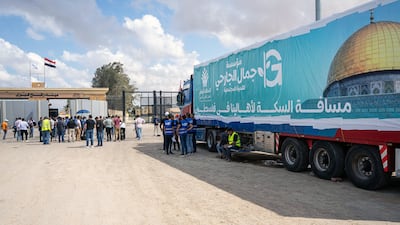Live updates: Follow the latest news on Israel-Gaza
UN officials will inspect the cargo of lorries carrying water, food and medical supplies before they are expected to start moving to Gaza on Friday, Egyptian security officials have said.
Two weeks of relentless bombing have killed more than 3,800 and displaced one million people in Gaza.
The Egyptian officials said the supplies, at Israel's request, would not include fuel. The inspection would take place in the no-man's land separating the Egyptian and the Gaza sides of the border crossing at Rafah, in northern Sinai, and the lorries were expected to start heading to Gaza on Friday.
Mark Negev, an adviser to Israeli Prime Minister Benjamin Netanyahu, said on CNN that Israel had agreed to allow aid to Gaza “in principle” but “we don't want to see Hamas stealing aid that's directed towards the civilian population. It's a real problem”.
Humanitarian groups told The National that a safe passage is vital to deliver the aid and the 20 lorries awaiting to enter Gaza are not enough to meet civilian needs.
“This is not enough to deal with the scale of needs in Gaza that resulted from almost two weeks of bombardment. The UN has said at least 100 lorries are needed every day,” the Norwegian Refugee Council's media adviser, Ahmed Bayram, said.
“People in Gaza are suffering from a siege upon a siege that could cost lives if not reversed immediately.”
UN aid chief Martin Griffiths told the Security Council on Wednesday that the organisation wanted to bring aid deliveries to Gaza back to 100 lorries a day, the level before the Israel-Hamas conflict.
The International Committee of the Red Cross called for a respite in the fighting to allow aid to enter the enclave.
“Every day that aid is not entering, the situation gets worse. With no fuel, no electricity, and dwindling medical supplies, people's suffering will increase by the minute with the continuing fighting,” Chris Hanger, the ICRC's spokesman said.
ICRC spokesperson
“The sooner aid and additional staff can enter Gaza, the better,” Mr Hanger said, adding that an ICRC convoy carrying 60 tons of aid, including urgently needed medical items, has been mobilised for Gaza.
The main issue is to ensure “safe humanitarian access to deliver the aid”.
The humanitarian groups spoke out as UN Secretary General Antonio Guterres arrived in Cairo for talks with Egyptian leaders that are likely to focus on aid to Gaza.
Egyptian officials also discussed the issue one day after US President Joe Biden spoke with the country's president, Abdel Fattah El Sisi, by phone while flying home from a brief visit to Israel.

Mr Biden told reporters that Mr El Sisi agreed to open the Rafah crossing from Egypt to Gaza to allow about 20 lorries carrying humanitarian aid into the coastal enclave, where people are running short of food, water, fuel and other essentials as a result of the Israeli onslaught and its total blockade of the strip.
Mr Biden did not give a timeline for the opening, but US national security spokesperson John Kirby said it would occur in coming days following repairs to the road.
Mr Biden told reporters he was blunt with Israel about the need to facilitate aid to Gaza.
Mr Negev, the Israeli presidential adviser, said on CNN that Israel had agreed to allow aid to Gaza “in principle” but: “We don't want to see Hamas stealing aid that's directed towards the civilian population. It's a real problem.”
Egypt has consistently maintained that it had not closed the Rafah crossing since the October 7 incursion by Gaza militants into southern Israel where they killed at least 1,300 people, mostly civilians, and took scores of hostages back to Gaza.
The Gaza side of the crossing, according to Egyptian officials, was bombed at least four times by the Israelis, rendering it inoperable. The Egyptians have repaired it at least once.
But the crossing is in effect closed to Gaza's Palestinian civilians because Egypt does not want a mass movement of population fleeing the bombardment and the siege into Egypt.
Egypt argues that allowing them to come en masse into Egypt will contribute to the “liquidation” of the Palestinian cause and put Egypt's national security at risk.
It has, meanwhile, set up field hospitals on its side of the border and put hospitals in the nearby city of Al Arish and the Suez Canal city of Ismailia on high alert to receive wounded Palestinians. No wounded Palestinians have crossed into Egypt to date.
Notably, Mr Biden made no mention in his comments of the estimated 500-600 nationals, including US nationals, who are stranded in Gaza and are desperate to leave for Egypt en route home. Cairo had previously insisted that it would only allow foreign nationals to come to Egypt if it was allowed to send humanitarian aid to Gaza's 2.3 million people.
In Cairo, a statement from Mr El Sisi's office issued late on Wednesday said the Egyptian leader and Mr Biden have agreed to provide aid to Gaza “in a sustainable manner”. They were coordinating an aid effort with international organisations under UN supervision.
An estimated 100 lorries laden with humanitarian supplies have been lined up on the Egyptian side of the Rafah crossing for a week, waiting for the green light to move into Gaza.
Stockpiles of supplies that arrived by air are being stored at Al Arish, 45 kilometres west of Rafah.
The aid comes from Egypt, Jordan, Saudi Arabia and a host of other Gulf Arab nations. The UN World Food Programme and the Egyptian Red Crescent have contributed to the aid and are expected to jointly supervise the operation.


